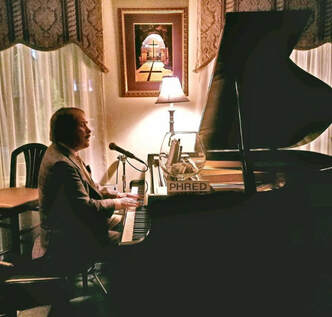Meet Phred."No, that's not a mantra from Glen Holland in "Mr. Holland's Opus." It is the philosophy of Phred Meller of Hillsdale, who has spent the past 15 years practicing what he preaches in Bergen County."
|
Phred Meller

Phred knows of what he speaks. He spent years as a cocktail lounge pianist at Steve Wortendyke's Inn at Midland Park. "You learn so much from playing six nights a week-you come at it from any angle when you do it so often".
Raised and educated in California, Phred was hardly what you'd call a child prodigy. Although he began studying piano at age five, he gave it up at 11 for a typical reason: sports. He didn't look back until he was in high school, when he began cutting classes to go to a friend's house to play the piano. "It wasn't playing what I was taught-the classical music and the stuff from the notebooks. It was playing songs I knew my friends and relatives would like – or "what's happening now (then)".
Phred's piano playing picked up tempo with some formal training in Hollywood, and later New York, where he studied at Julliard. "I did some work on soap operas and in the theater, but I got so involved with piano that when an acting gig came up I'd forgotten what I was really there for."
By his mid-twenties, Phred's career was clearly on the piano track, and playing slowly gave way to teaching. "I think I read every instruction ever written in all of humankind - and even though I'd been playing almost my whole life, I didn't understand them at all, they were hopelessly outdated". Phred also realized that few teachers were teaching how to play without sheet music at all-which is what most students actually strive for.
"Imagine you're going to a friend's home for dinner, and someone says, "Hey, I hear you're taking lessons. Why don't you play something?" The last thing you want to do is go back to the car and get your sheet music. It makes more sense socially to play without music. If you can dash off some show tunes, they love it," he said.
Phred insists you don't have to be born with a magic ear to play piano without music. "If you can tell whether a note is higher or lower, you can do it. It's like learning to talk without reading. You're imitating sounds."
A typical lesson with Phred, or one of his assistants, is broken down into sound logic, sight reading and touch. For most adults and children, what sets these lessons apart is the approach taken by the teacher.
Fourteen year old Matthew Mazon of Emerson has been taking lessons with Phred for only a few months, and what he likes most is the flexibility. "If Phred sees that something is not working that day, he'll go off the plan book, do what it takes to keep my attention and help me play better."
"What I like best about the lesson," said nine year old Daniel Mazon, who's been playing since age five, "is going through the book and picking out the songs I want to learn how to play."
"Taking piano lessons, especially for kids, should not be a pain," according to Phred. "Kids will give it up if it is boring and repetitive, and if the music means nothing to them."
Phred is well aware of the diversions kids have these days. "I try to make it easy and as fun as possible, but at some point they have to put it over playing Nintendo and watching TV. It's got to be important enough to put it somewhere in the weekly schedule." But, Phred advises, parents shouldn't expect children to practice piano for hours at a stretch. Ten minutes, three times a day, will do just fine, thank you.
"There is no devotion to the practicing," Debby Mazon said about her sons. "Sometimes they can only practice a half-hour several times a week. But we schedule it in between other activities and they're both enjoying their lessons and getting a lot of satisfaction from playing."
Paulomi Mehta of Hillsdale concedes that she would feel more comfortable with the traditional lessons for her nine year old daughter Twisha. "But Twisha enjoys it precisely because it isn't too structured. She's not exceptional, but she is pretty good- and she's happy taking lessons and practicing, even if it is only 10 to 15 minutes at a time."
"There is no question that practice is important," Phred acknowledged. But he emphasized that it's more important that piano playing be fun: "It is not about a rigid set of programs. It is about expressing feelings. That's the bottom line. And practicing is like a workout. You always feel better when you're done.
